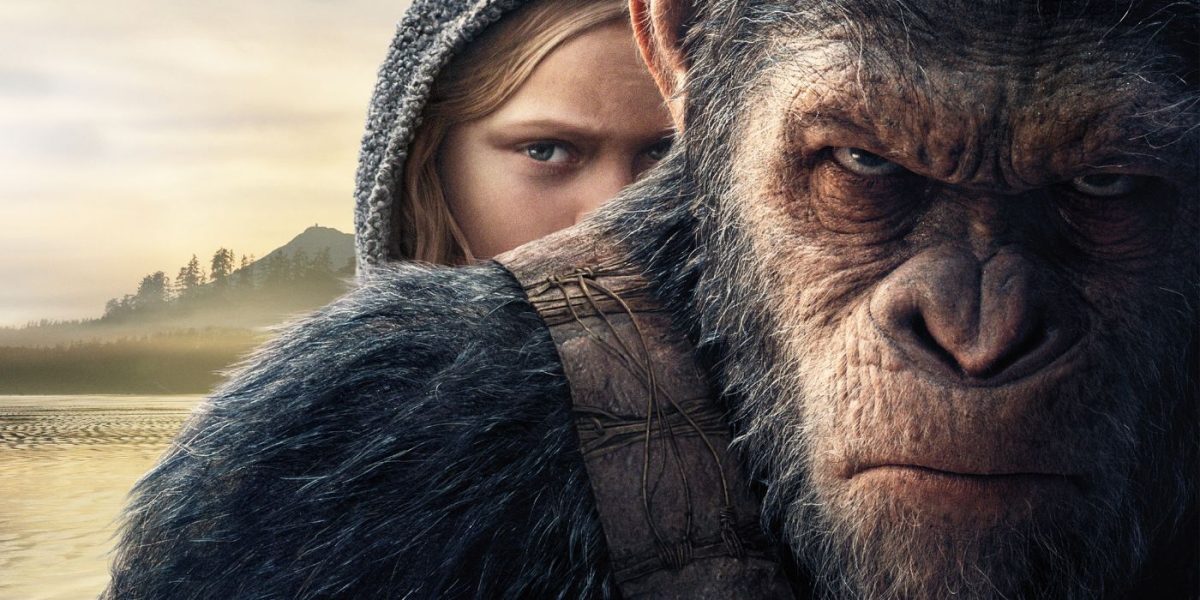
The Real Message of Planet of the Apes Has Always Been in Front of Our Face
May 14, 2024
The Big Picture
Planet of the Apes highlights language as the key factor differentiating humans from apes.
Language leads to complex thought, causing both humans and apes to face similar challenges.
The series explores the power of language and its impact on society, ultimately leading to apes gaining dominance.
What makes us human? According to Stanley Kubrick’s 2001: A Space Odyssey, it’s our ability to use tools that separate us from our simian ancestors. In his sci-fi epic, Kubrick boils down the entire story of humankind from its inception as apes, discovering how to utilize tools to overpower their natural enemies, all the way to humanity’s inevitable rebirth, deep into the space age. However, scientists have long since decided that this theory about the cornerstone of human civilization is false. In fact, many animals use tools, not just humans. Then what makes us humans unique? Perhaps surprisingly, the sci-fi film series that succeeds in getting the answer right is Planet of the Apes.
Since the original 1968 film, and the novel that inspired it, Planet of the Apes has been a powerful allegory for the human race’s treatment of “the other,” and our tendency to blow up the paradise we inhabit as a result. Therefore, what makes us human, when compared to our ancestral apes, is not our use of tools and weapons of mass destruction, but rather, our ability to develop such plans in the first place. In short, language is the cornerstone of our species. It’s notable that in the original film, Taylor (Charlton Heston) finds himself in a world where apes are well-spoken, but more importantly, humans are portrayed as mute and therefore primitive. Language is often how we take pride in our national and regional identities, but it’s also resulted in incessant conflict, as the recent reboot trilogy explores.
‘Rise of the Planet of the Apes’ Gives Apes the Gift of Language
Image via 20th Century Studios
2011’s Rise of the Planet of the Apes serves as both a prequel and a reboot to the original series of films. It changes certain details within the canon, but ultimately tells the story of how Earth became the ape-governed world discovered in the 1968 movie. The film focuses on Caesar (Andy Serkis), a chimpanzee born with an experimental cure for Alzheimer’s passed down from his test-subject mother. Caesar embarks on a startling evolution, becoming fluent in sign language thanks to his human guardian, Will (James Franco). The science-fiction premise that this film poses is essentially just Caesar’s linguistic journey.
Gifted with exceptional intelligence, Caesar is depicted as being just as conscious as humans. It’s not long before the cruelty of man, particularly against apes, leads Caesar to inspire a revolution, and it’s through language that Caesar not only forms his small army of apes, but it’s also how he declares to the humans that they refuse to be oppressed any longer. Caesar’s “No” in the face of cruelty from Dodge Landon (Tom Felton) remains one of the most bone-chilling moments of the franchise, and that is precisely why.
Set ten years after the events of the previous film, 2014’s Dawn of the Planet of the Apes establishes a world in turmoil. Caesar’s tribe of liberated apes continues to inhabit the Muir Woods near San Francisco, while the experimental Alzheimer’s cure has resulted in a virus that has eliminated countless humans. A small group of surviving humans led by Dreyfus (Gary Oldman) live in the city, and the film establishes an uneasy peace between them and the apes. It’s clear that both species have resorted to hunting and gathering to survive, and with fluent communication within both camps, apes and humans are on equal footing at last. The trouble begins when the humans wish to work on a dam within the apes’ territory, and it’s clear that neither side wishes for this to result in conflict.
Related This Planet of the Apes Film Flips the Script of the Original You maniacs! You blew it up!
Dawn of the Planet of the Apes is where the series gets to explore the true implications of language, and the burden of intelligence that comes with it. Among both camps are those willing to trust the other (Caesar and Jason Clarke’s Malcolm) and those whose pride and pessimism risk peace in favor of victory (Dreyfus and Toby Kebbell’s ape Koba). This film displays that, with complex language comes philosophy, and individual ideologies inevitably branch off. Caesar soon comes to the sobering realization that anyone equipped with the tools of language has the potential to make the same mistakes as humans. Going into the trilogy’s final installment, Caesar becomes a bitter ape, uncertain whether his species is any more worthy of that power than its predecessors.
‘War for the Planet of the Apes’ Takes Language Away from the Humans
More years have passed by the time we are reintroduced to this world in 2017’s War for the Planet of the Apes. When Caesar’s family is murdered by a rogue human army, we’re introduced to a version of Caesar far more cynical than we’ve ever known before. As per 1968’s Planet of the Apes, It’s revealed that the simian virus has evolved to deprive infected humans of their ability to speak, leaving them a primitive shell of their former selves. Disgusted by the idea of humans as the next generation’s speechless animals, an army Colonel (Woody Harrelson) urges his men to euthanize their infected loved ones and wage war on the apes.
Like Caesar, the Colonel’s greatest power is his ability to influence people through speech. The Colonel’s manipulation tactics even result in getting specific apes to work for him. Caesar’s mission this time is much darker than in previous stories, with hate in his heart for the Colonel. Caesar eventually realizes that killing the Colonel would only succeed in fulfilling the destiny that he fears so much. When the Colonel is infected by the virus, he recognizes just how much power he has lost by losing his speech. The Colonel decides to kill himself, rather than become a voiceless primate. This marks the official hand-off between humans and apes, with the planet of humans finally becoming the planet of the apes; not by apes killing humans, but rather, by the apes gaining language and humans losing their greatest tool as a species.
The Planet of the Apes Franchise Represents the Cyclical Nature of Life
Image via 20th Century Fox
With Kingdom of the Planet of the Apes attempting to further fill in the gaps between the original films and the prequel trilogy, the overall symbolism of the franchise begins to become clearer. Language represents power and intelligence; the ability to communicate effectively, whether through spoken language — or even gestures — is closely linked to characters’ social status throughout the entirety of the franchise. The films explore themes of oppression, hierarchy, and prejudice through the lens of language, highlighting how these linguistic differences can shape power dynamics.
Planet of the Apes fully succeeds in its symbolism because of its ability to tell this story naturally throughout several decades in-universe. Whereas a franchise like Star Wars has a tendency to box itself in — telling stories where audiences already know the beginning and ending points and often the fates of the characters themselves — Apes has a more ambiguous middle period to play with, and audiences get to watch the story unfold organically.
One of the most harrowing, but also familiar aspects of the franchise is the cyclical nature of its story. History tends to repeat itself, a lesson humans begrudgingly continue to learn. Through Planet of the Apes, audiences can watch humanity’s failures in real-time, equating them to the evolutionary cycle that has known Homo sapiens as the top of the food chain since their existence. From the 1968 original to the recent release of Kingdom of the Planet of the Apes, this franchise relies entirely on exploring language and how this difference between the apes and humans is integral to the new world they both find themselves in.
All Planet of the Apes movies are available to stream on Hulu in the U.S.
Watch on Hulu
Publisher: Source link
Laverne Cox Reacts To Donald Trump’s Election Win
Laverne Cox discussed why she's considering leaving the US following Donald Trump's win in the 2024 election. In a new interview with Variety, Laverne said that she and several friends were considering a move: "We’re doing research on different cities…
Nov 14, 2024
Alexandra Daddario Reveals Postpartum Body 6 Days After Giving Birth
Alexandra Daddario Shares Candid Photo of Her Postpartum Body 6 Days After Giving BirthAlexandra Daddario is embracing new motherhood. Days after welcoming her first baby with husband Andrew Form, the White Lotus alum shared a photo of her postpartum body…
Nov 14, 2024
Fans Are Reacting To Rihanna's Recent Comments About Shifting From Her Music Career, And They're Worried To Say The Least
"She tryna tell yall that she not releasing any music baby," one user wrote.View Entire Post › Disclaimer: This story is auto-aggregated by a computer program and has not been created or edited by filmibee.Publisher: Source link
Nov 13, 2024
Gigi Hadid & Bradley Cooper Twin During Limitlessly Chic NYC Date
A twinning moment is born. Gigi Hadid and Bradley Cooper—who have been quietly linked since October 2023—proved their romance is as strong as ever as they stepped out in coordinating looks for a stroll in New York City on Nov.…
Nov 13, 2024











